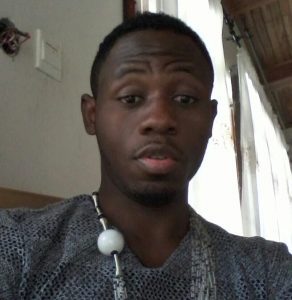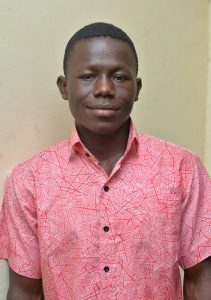Kwaku Feni Adow, from Ghana, has two Haikus in the 2016 Babishai Haiku shortlist. He spends lots of time writing Haikus and his knowledge of the craft is admirable.
 |
| Courtesy photo |
How do you define Haiku?
Haiku is that poetry which seeks to evoke nature in three (not always) brief/succinct lines, painting a picture with words where the poet is bound by the spirit of the art to show not tell. The poet is not as much allowed to intrude with his emotion or opinion. The best haiku have depth, many meanings that can be read into it when images are well juxtaposed.
What is the process of haiku writing like for you?
Writing haiku for me starts with an inspiration, a little moment of insight in finding something new in the ordinary. This mostly comes about from observation, childhood memories and from reading haiku, albeit the inspiration is only the beginning point. After writing down the words that present themselves in the moment, I let the poem lie and come back to it later, this time weighing and assessing how each word employed helps make the haiku better.
Were you surprised at being shortlisted?
I must say that I was surprised especially that two of my poems got shortlisted.
Do you spend a lot of time reading Haiku, and from where?
I do spend a lot of time reading haiku. Besides the pleasure in reading haiku, part of the process of writing or learning the art is reading lots of it. My sources are online journals dedicated to publishing top-notch haiku, few examples would be Cattails, Heron’s Nest, Frogpond and Africa Haiku Network.
Which African Haiku writers do you know and admire?
Thankfully, there are quite a number of African haiku poets I know. The likes of Celestine Nudanu and Barnabas Ìkéolúwa Adélékè. It’ll almost seem like a sin to not mention Adjei Agyei-Baah who to me is a haiku genius not just in Africa but in the world, evidenced of course by his numerous awards and publications in reputable journals. Again I know and admire the work of his fellow from Nigeria Emmanuel Jessie Kalusian. These two have had influence on me as far as my haiku journey is concerned.
Have you heard of the Mamba Journal, a publication of Haikus,
produced by the African Haiku Network, co-founded by one of our judges, Adjei Agyei-Baah?
I have indeed heard of the Mamba and I am happy to have five haiku of mine published in its premier issue.
How do you feel we should promote African haiku?
I believe haiku can be promoted through contests like this. Also, I believe a constant hosting and/or promoting the efforts and work of groups like Africa Haiku Network and any other Haiku Society anywhere in Africa on this platform can expose the art to the numerous visitors.
Any parting remarks?
I would like to say thank you to Babishai Niwe Poetry Foundation for taking this step to have the very first haiku contest in Africa for African haiku poets. This is the support the art truly needs and we are all appreciative of that. To the other shortlisted poets, congrats.
Thank you Kwaku.
The #Babishai2016 Poetry festival runs from 24 -26 August in Kampala at Maria’s Place in Ntinda.
